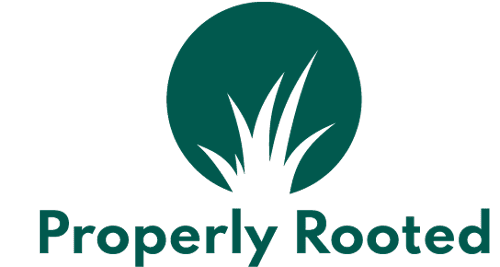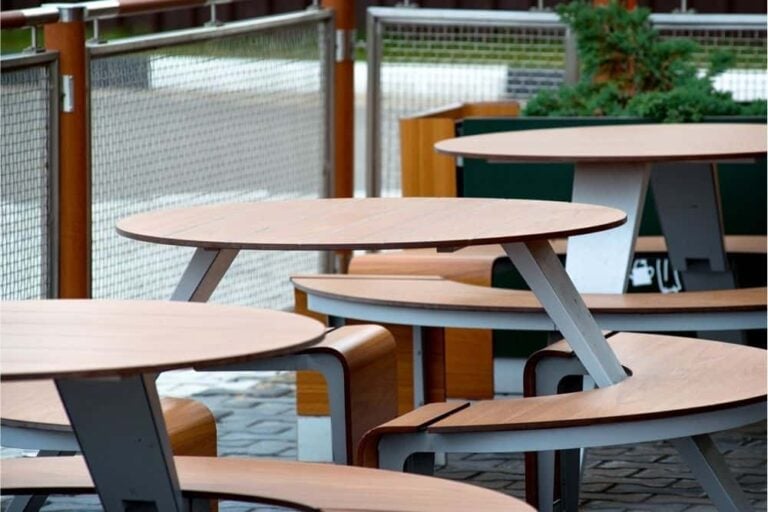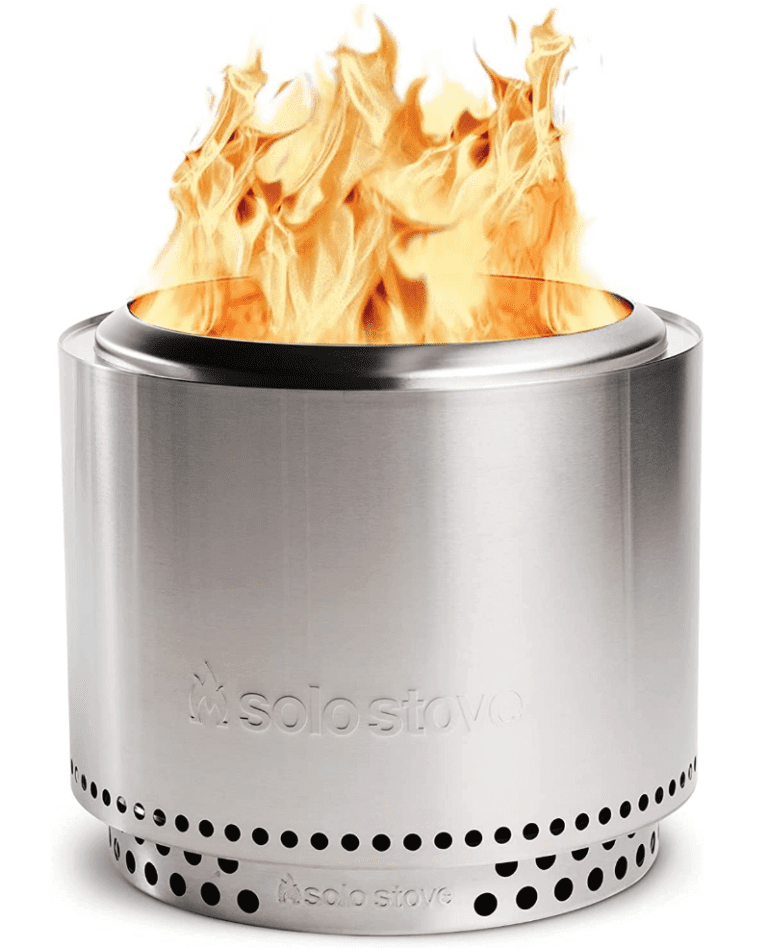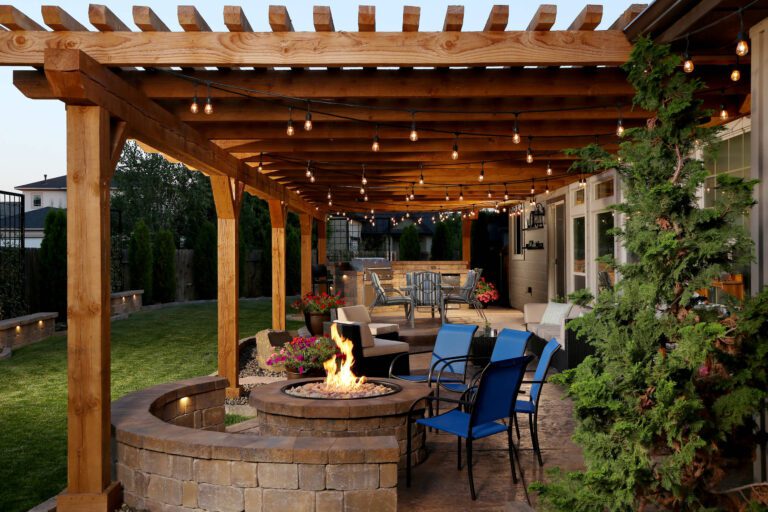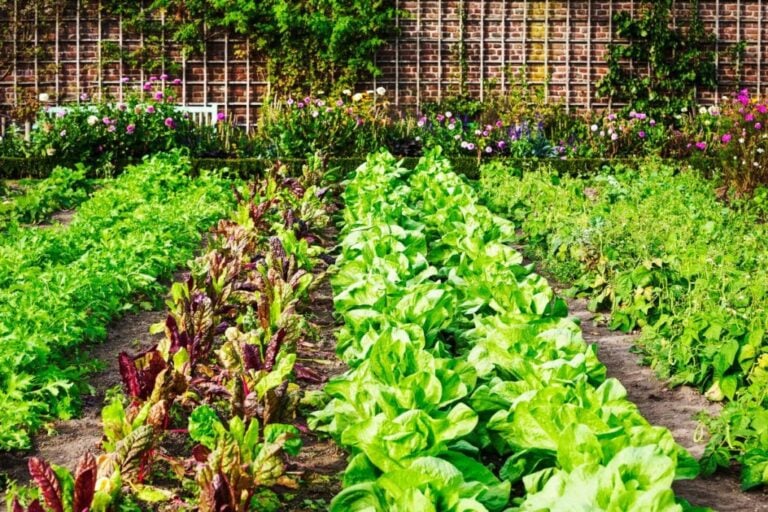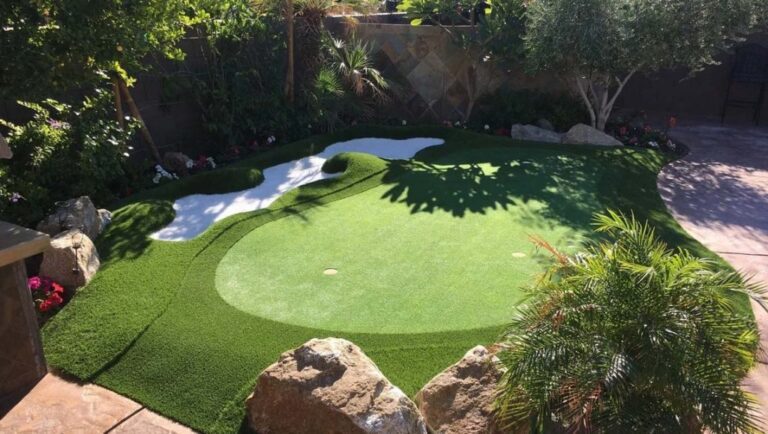What To Feed Deer In Your Backyard To Keep Them Coming Back!
You may be finding that your backyard is attracting all kinds of wildlife including deer which can be potentially damaging to your garden if you love to grow plants that they are known to graze and feed on.
Having plenty of food specifically laid out for deer will not only help your local wildlife to thrive but will also ensure that they are distracted from eating plants that you worked hard to grow.
Knowing what to feed the deer is important as they have delicate digestive systems and there are a lot of foods that are toxic and poisonous to them which is why we have curated this guide to take you through everything you need to know about feeding the deer in your backyard and how to get them coming back.
Not only have we compiled a list of the foods that are great for deer, but we have also included the advantages and disadvantages of feeding deer as well as the best options on the market and an FAQ where we answer the most commonly asked questions so you can make a fully informed decision with confidence.
What Kind Of Foods Do Deer Eat?
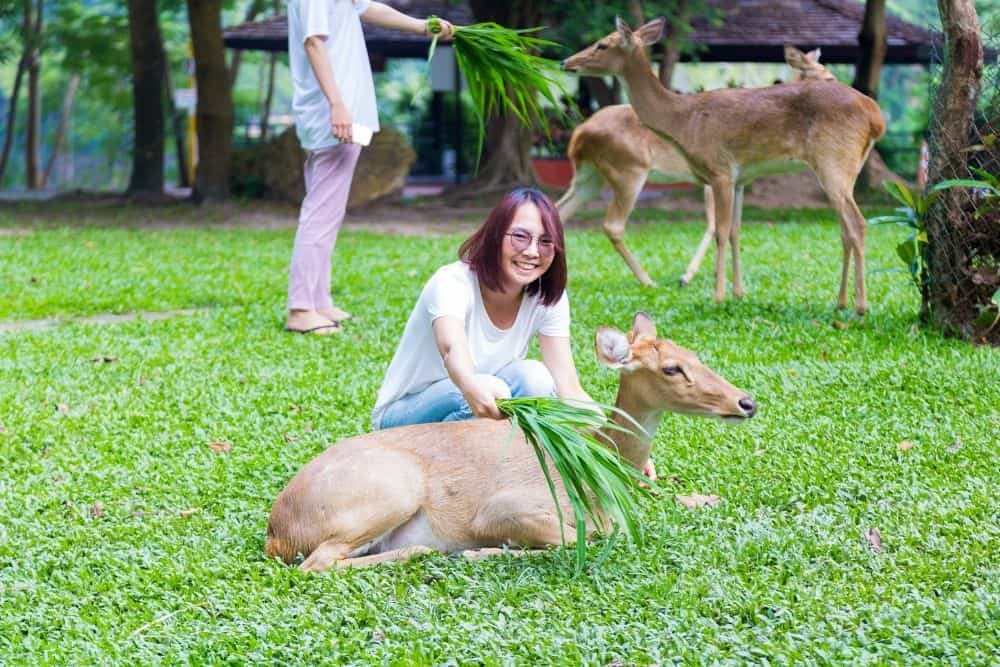
Before we delve into the specific foods that deer eat, it’s important to know what kind of diet they follow so you can learn what food to expect when feeding them.
Deer are herbivores which means that their diet consists mainlny of fruits, nuts, and plants and the availability of this can change depending on the season.
A great option for those who don’t have an array of fresh fruits and plants to hand and don’t have the time to prepare is to buy premade deer food that is guaranteed to contain all the nutrients and vitamins that they need to thrive.
A main reason why you may find deer wandering through your backyard is that they will most likely be looking for food that has become scarce in their usual territory so preparing plenty of food that is crucial to their diet will mean that they will come back again. But should you feed deer? Read on to find out!
Should You Feed Deer?
It’s important to think about whether you should even feed deer and luckily, the answer is yes, especially during the winter months when there is barely any food left that the deer love to eat.
Lots of deer rely on the help of humans to provide them enough food to get through these months but there are certain rules that you should follow in order to boost their health and prevent any problems from occurring which tends to happen when people do not put out the correct food.
Here are some tips that you should follow:
Do Not Feed The Deer Only Once
The first thing you need to avoid is only feeding the deer once. This is because the deer will come back expecting more food in its place which can prove fatal if it is winter and they are relying on you for food.
If you have fed the deer, especially at the start of winter, then it is your responsibility to continue providing enough food for the subsequent months until at least springtime when their food begins to grow naturally on its own and they won’t have to rely on you as much.
Do Not Feed The Deer Human Food
A lot of people are tempted to put out their scraps thinking that it is suitable for deer to eat but this is actually not the case as human food tends to be full of unhealthy elements that can be toxic for deer to eat.
Do Not Place The Food In One Area
When placing the food out, make sure that you spread the food out across a wide area as putting the food in one place will attract lots of deer in one place which in turn can attract a predator.
Place The Food Far Away From Any Dangerous Spots
Make sure that you place the food away from any dangerous locations. For example, if you live near a road then make sure you place the food away from the road as this will prevent any accidents from occurring.
What Food Do Deer Eat?
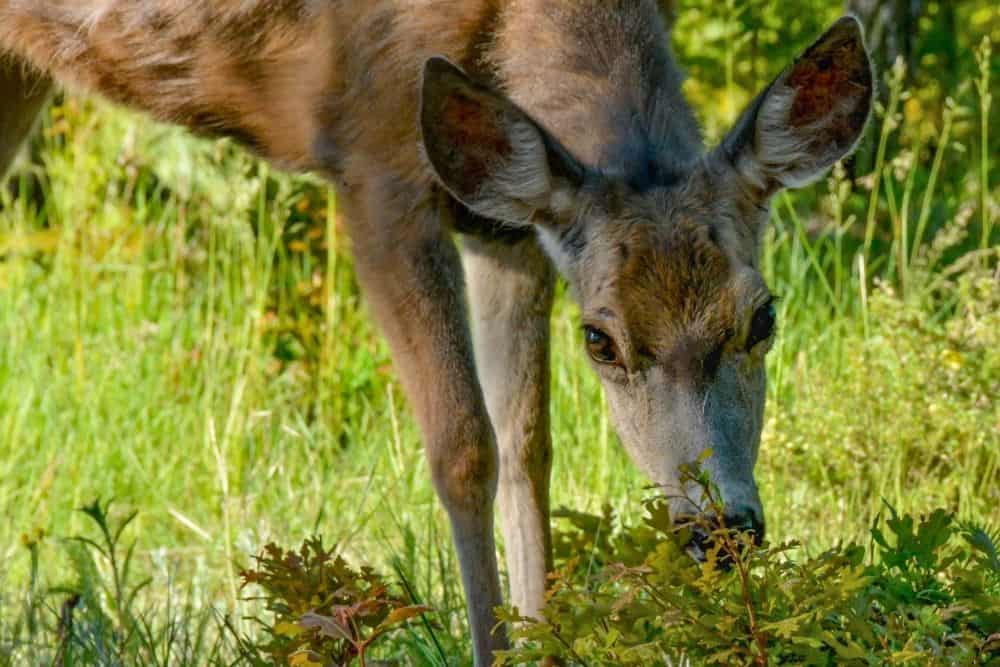
As mentioned before, deer are herbivores which means that they mainly eat fruit, plants, and nuts but what makes them different from other herbivores is that they search for food high up in the trees by extending their necks which allows them to find plants and foliage that they enjoy that other herbivores can’t reach.
This means that they are known as ‘selectors’ as they can find food that is more nutritious than others.
They also eat extremely fast but take time to properly digest it which makes them ruminators while their food habits change depending on the season. But what do they actually like to eat.
Here are the important things you need to know about what food deer enjoy eating:
Browse
The first part that you need to know about the deer diet is the ‘browse’ which consists of the shrubs and trees that provides them with the stems and leaves that are important for their diet.
Regardless of what Disney movies may have you believe, adult deer don’t actually like to eat grass unless they are desperate for food but fawns need it to help with growth.
Mast
The second part of the deer diet is the ‘mast’ which is the variety of the fruits and nuts that provide deer with the energy that they need.
When considering what fruit is best for deer, choosing something such as blackberries, grapes, mulberries, and plums while they are growing and switching this to apples and pears during the fall months as they contain plenty of fat which is important for the winter months.
When it comes to what nuts deer love to eat, choosing acorns and chestnuts are crucial for their diet as they contain a lower tannin content which can slow down the digestive process.
Cereals
Another kind of food that deer love to eat are various kinds of cereal but it’s important to make sure that you don’t feed them too much as it can cause issues on their digestive system.
Cereals such as oats, rye, and wheat are popular but as mentioned, making sure you limit the amount of cereals put in your deer food mix is essential.
The Best Food To Feed Deer
Now that you know what kinds of food to expect, we’ll dive into what food you should purchase to feed the deer in your backyard.
Bear in mind that a lot of these options may attract other local wildlife as well which can help your local ecosystem thrive, especially during winter months.
Legumes
A great and unexpected option that deer love is legumes such as black eyed peas, purple hulled pease, and soybeans, as they are easy and quick to digest.
These options cost more than the others in this list but they are sure to go down a treat and provide the deer with the fats they need to store during winter when their fatty foods aren’t as readily available.
Oats
The simplest food that you can feed to deer are oats which is a great choice for those on a budget as it provides deer with the carbohydrates and fiber that they need to thrive during the winter months and will encourage population growth.
Readymade Deer Mix
The easiest option for those who are too busy to prepare fresh food for deer is to purchase a readymade deer mix that contains a variety of alfalfa, corn, oats, molasses, and soybeans, as well as some fruits and nuts to provide plenty of vitamins and nutrients including protein to give the deer plenty of energy to survive during winter.
Making sure that the mix has a minimum of 12% protein will ensure that they get a balanced diet so make sure that you read the labels.
What You Shouldn’t Feed Deer
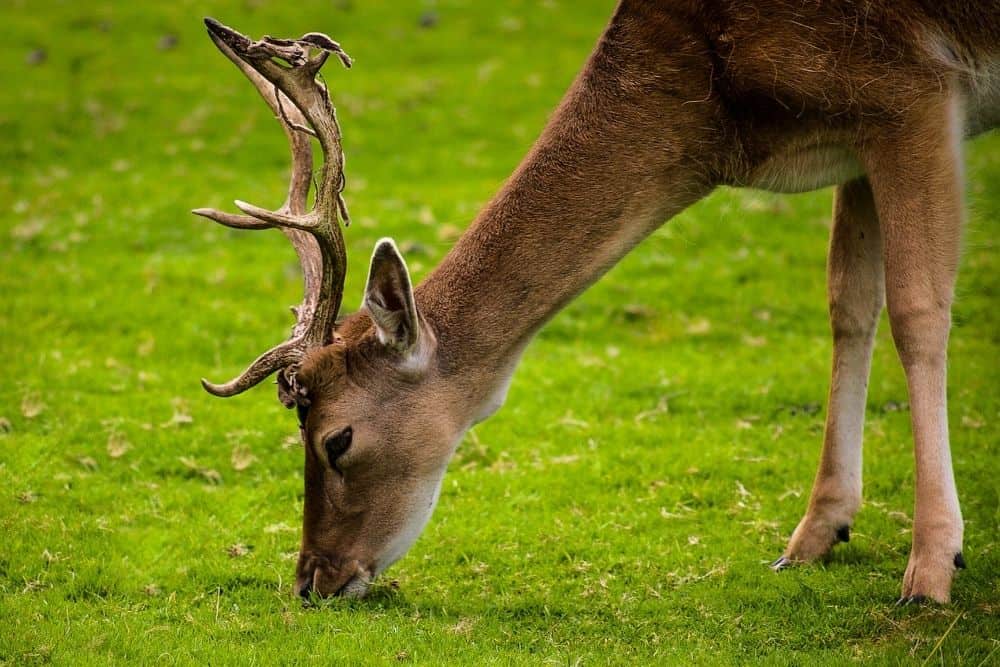
Since we have delved into what foods you can feed to deer, it’s also important to consider what you shouldn’t feed them. This will prevent any upset to their diet and ensure that they are eating foods that are beneficial to their digestive system and health.
Here is a list of the basic foods that you should avoid feeding to deer:
Animal Remains
The first thing should be avoided at all costs is any animal remains. The first thing you have learned about deer is that they are herbivores meaning that they avoid meat and other animal products.
Therefore, it would not only be unnatural and unsuitable for their diet, but it isn’t going to bring any nutritional or beneficial advantages to their overall health.
Corn
A popular option that people go for is corn and it’s easy to see why as a lot of readymade mixes contain corn; however, these mixes only have a small proportion of corn to other ingredients as corn can be highly acidic in the digestive system when too much is consumed.
Therefore, you can feed the deer corn but only in very small amounts.
Hay
This cannot be stressed enough but deer do not like to feed on grass or hay.
Where grass doesn’t pose any harm, hay actually can. This is because deer cannot digest hay properly meaning that they can actually starve due to the hay blocking their stomachs from digesting any other food.
Human Scraps
We have delved into this point previously but it’s important to reiterate that deer are not like other animals that you may feed your scraps to.
Regardless of what the food is, the chances are that they will not be able to process the scraps because they are not capable of eating human food therefore make sure that you avoid doing this.
Advantages And Disadvantages
As with anything, there are advantages and disadvantages that come with feeding deer in your backyard and it’s important to learn both sides of the argument so you can decide whether you feel it’s right for you to do.
Here are the advantages of feeding deer in your backyard:
- The first advantage is that feeding deer in your backyard during the winter months can help to supplement the food that they need that tends to be hard to come by and in scarce supply.
- Providing deer and fawns through their growing periods will ensure that they develop healthy antlers.
- Feeding deer will mean that they are having healthy food that is beneficial to their diet rather than them being fed on unhealthy foods such as scraps.
- Fawns will be able to survive the winter months as they will have the food they need to grow.
Here are the disadvantages of feeding deer in your backyard:
- Feeding the deer can cause an overpopulation of deer that could cause issues to your local wildlife in a few years.
- When you start feeding the deer, you have to make sure that you continue feeding them as they will become reliant on your food meaning that it can cause a huge increase in your spending.
- Deer have reputations for causing damage to properties and are known for eating plants that grow in the garden.
- Deer are carriers of various diseases and ticks that can be passed onto humans if you come into contact with them.
Tips On Feeding Your Deer
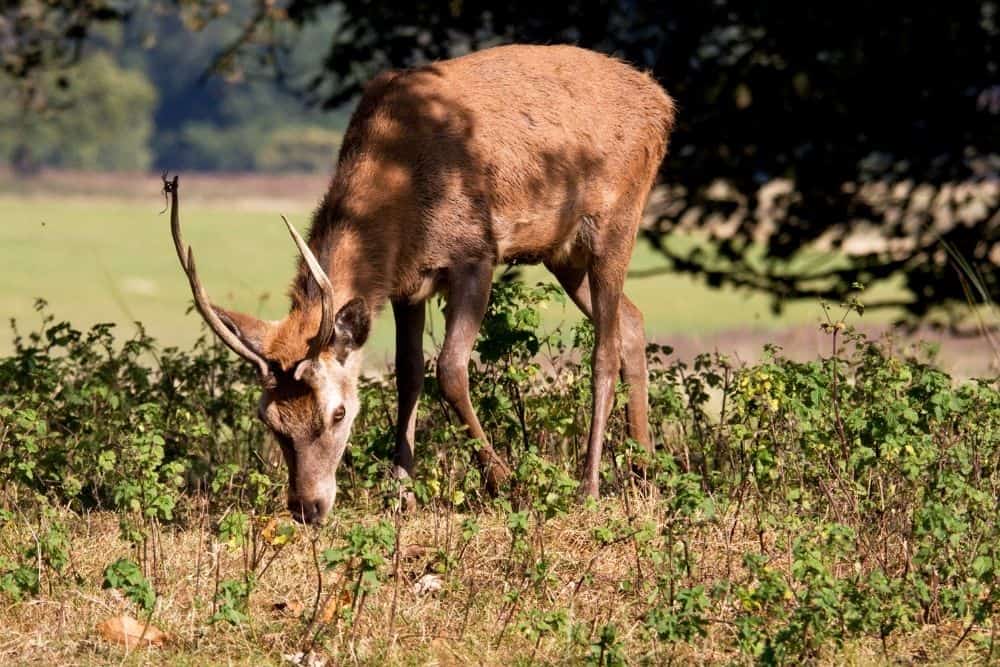
Not only is it important to know which foods are harmful and which foods are recommended but there are an abundance of tips that you should think about and consider when feeding the deer. Here are just a few:
- Placing the food out at dawn and dusk is recommended as this is when deer are most likely to be active and searching for food.
- Put out a lot of food so plenty of deer can get their fair share. If you only put out a little bit of food, this can lead to fights among the deer and other wildlife who are competing for their nutrients.
- As mentioned earlier, make sure that you scatter the food across various places as this will ensure that predators such as bears, coyotes, and wolves will not be led to one specific place where the deer and other animals gather.
- Bear in mind that dogs can also become predatory towards deer so make sure that you keep them away from the deer while you are placing the food out.
- Make sure that you prepare your backyard for some damage as deer are known to eat various plants.
- Spreading the food in different locations will prevent the deer from spreading disease or catching disease.
Attracting Deer To Your Backyard
You may have decided by this point that you want to start feeding deer in your backyard but may not know how to actually attract the deer to come over.
In this section, we’ll be delving into various tips and tricks you should consider to make your backyard a popular place for deer to come for their food. Here are just a few ways that you can attract the deer:
Water Source
The first method is also the simplest which is providing a parallel water source along with the food.
The water source doesn’t have to be anything fancy as it could be a birdbath or a kids’ pool. Bear in mind that this will likely get damaged so make sure that you don’t mind your water source facing a lot of wear and tear over time.
Make sure that the water is clean and fresh every time you put food out as this will reduce the chance of water poisoning and ensure that the deer are hydrated.
Mineral Blocks
If you want to attract deer quickly then mineral blocks are the best way especially for growing deer as it promotes healthy antler growth and can ease the lactation process.
Calm Atmosphere
Deer are known for being very cautious creatures and can be scared off very easily. Therefore, it’s important to make sure that your garden has a calm atmosphere that will make them feel safe and secure as they have their food.
Make sure that there are no loud noises or busy roads nearby that can fighten them off quickly.
Remove Fences
If you want to ensure that the deer will come back then remove any fences that make it difficult for the deer to access the food.
Deer don’t like to jump at great height so they may get the food once but it won’t guarantee a repeat visit, even if the food is of high quality.
Minimize The Use Of Bright Lights
Make sure that there are no bright lights nearby as this is another component that can scare deer.
There is a reason why “deer in the headlights” is a common phrase so take it literally and try to minimize the amount of lighting in your backyard.
Salt Lick
Lastly, place out a salt lick for the deer as they will be attracted by the scent and will keep coming back for food.
Salt is guaranteed to work, especially if you have a lot of deer that live in your area and it is also an incredibly cheap option to use making this one of the most essential tips to keep in mind.
What Plants Attract Deer?
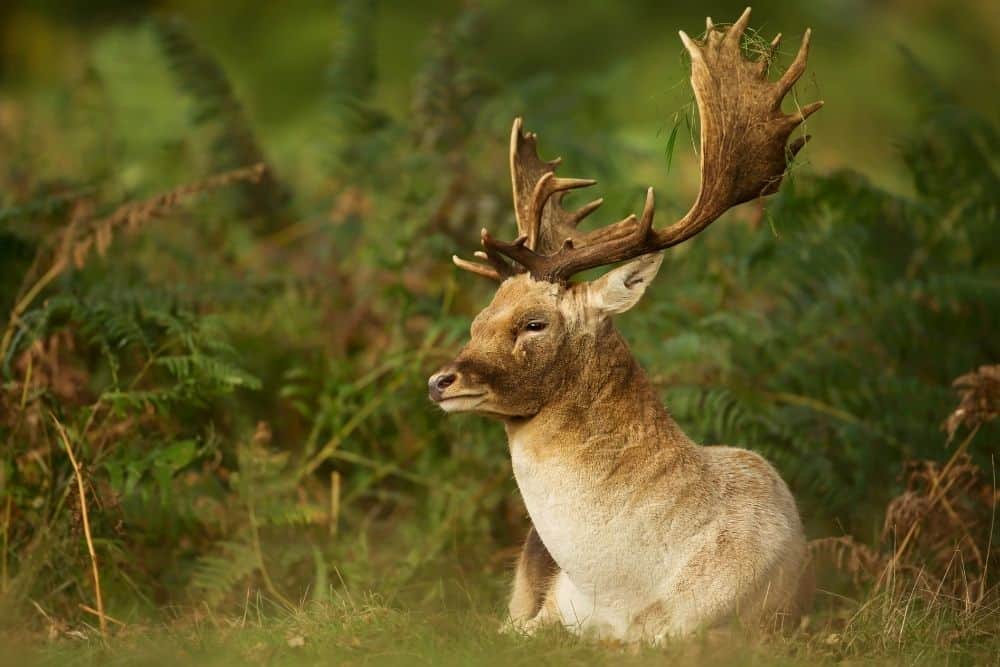
It’s no secret that deer absolutely love plants and they have been known to ruin many gardens as they don’t know the difference between plants that you have grown and ones that are wild.
Here are some plants that are guaranteed to be a hit with your local wildlife:
Bluegrass And Fescue
The first thing you should consider planting is bluegrass and fescue which are types of grasses.
We have mentioned several times that deer don’t like to ear grass but these variations are not like regular grass as they can be digested properly.
However, make sure that they are free from any pesticides as this can cause serious problems when consumed.
Ferns
Planting some ferns can be a great way to provide food as well as shade, especially if you place the food in open spaces.
There are a variety of different ferns that are sure to be a hit with the deer but some of the most popular options are crabapples, honey locust, persimmons, red oak, and white oak but there are all kinds of choices to choose from.
Shrubbery
Lastly, the most commonly used plant is by far shrubbery as deer are known to graze through various shrubs all year round.
If its springtime and you want to plant for the deer then choose shrubbery as there will be plenty of food for them to eat and it will prevent them from walking further into your garden.
The best kind of shrubs that you should plant are either tall shrubs or trees as these will spread their seeds faster than lower shrubs and provide more food and encourage more natural growth.
Quick Comparison: Top Picks For Food That You Can Buy For Deer
[wptb id="508092" not found ]AT A GLANCE: Our Top Picks for What to Feed Deer in Your Backyard to Keep Them Coming Back!
What Is The Best Food That You Can Buy For Deer?
Now that you know everything you need to know about feeding deer and their diets, it’s important to know what kind of deer food is the best on the market that you can purchase rather than making deer food from scratch.
This is a great solution for those who don’t have the time to prepare fresh ingredients and want to buy lots of deer food in bulk. Here are the best deer food available on the market that you should consider:
Executive Deals Premium Whole Corn Feed For Deer
It also remains an excellent source of nutrition for wild animals as it is high in carbohydrates and is loaded with fiber which helps to reduce cholesterol levels while containing plenty of vitamin E and A making it food of the finest quality to ensure that the deer get plenty of proteins and nutrients to promote tissue and muscle growth.
This food is great for those who want to attract all kinds of wildlife in the area as it is extremely versatile and nutritious so it is great for deer as well as other animals such as birds, opposum, and squirrels among more.
Pros
- This food comes as a 10lb bag making it great for those who want to purchase a larger amount of food in bulk.
- A great option that is high in carbohydrates and loaded in fiber to lower cholesterol levels while containing plenty of vitamin E and A which helps to promote tissue and muscle growth so you can be sure that the deer is getting all the nutrients they need.
- A versatile food that was made with deer in mind but also attracts all kinds of wildlife such as bird, opposum, and squirrels among more making it ideal for those who have lots of wildlife living near their backyard.
Cons
- Deer cannot eat too much corn so make sure to control the portions
Wildgame Innovations 00323 Apple
This product is made in the United States and fulfills all the guidelines to ensure that the deer and other wildlife are eating food that is safe.
This bag weighs 5.1 lbs meaning that you have plenty without having to spend lots of money making it the best option for those who are working with a stricter budget.
This is a particularly great choice who have a lot of does in their backyard rather than bucks as it seems to fit their taste more.
The apple scent of the food is sure to attract plenty of deer as apple is a great component of the deer diet.
Pros
- Made from a mix of natural and artificial ingredients to ensure that it is filled with all the vitamins and nutrients that are essential to the deer’s diet.
- The bag weighs 5.1 lbs meaning that you will have plenty of food to feed the deer without spending too much money making it the best option for those who are working with a stricter budget.
- The apple ingredients provide a scent that is guaranteed to attract plenty of deer which is ideal for those who want lots of wildlife in their garden.
Cons
- Attracts more does than bucks
RIDLEY 41251 25LB Monster Deer Block
This block is great as it contains self fed protein which means that you can be sure that the deer are going to get the nutrients they need, especially during the winter months when they need to fatten themselves up.
This block is often regarded as a vitamin and mineral supplement as it provides the deer with all the vitamins and minerals they need without being too strenuous to set up.
Pros
- This 25 pound is guaranteed to last a long time and ensure that the deer are well fed for a long period of time.
- This block contains self fed protein meaning that this will provide the deer with all the nutrients they need to store for the winter months as it gives them plenty of energy.
- The block is a vitamin and mineral supplement as it provides the deer with everything they need for their diet and has the convenience of not being strenuous to set up.
Cons
- High price point
What To Feed Deer In Your Backyard To Keep Them Coming Back FAQs
Do Deer Eat Roses?
Deers do eat roses and are actually known to consume the entire plant including the stems, leaves, and blossoms and will often eat them at night.
This means that if you do grow roses in your backyard, it’s important to make sure that they are not near where the deer can access as they will be eaten.
Do Deer Eat Apples?
Deer are also known to eat apples and are a great part of their diet thanks to the high sugar content which is ideal during the fall months when they have to store plenty of fat for the winter months.
For those who want to feed deer an alternative to corn, apples are the best answer.
Do Deer Eat Grass?
A common misconception thanks to Bambi is that deer of all ages love to eat grass but this is actually not the case.
Fawns eat grass as it is easier to digest but adult deer won’t choose to eat grass or hay unless they are desperate.
Therefore, it’s not advised to feed the deer in your backyard hay or grass.
Do Deer Eat Bread?
Some people think that deer can eat bread but this isn’t the case at all as white bread is actually toxic for deer as it can cause lacticacidosis which is extremely deadly and can even be life threatening. Therefore, do not feed deer any bread.
What Are Some Scents That Attract Deer?
The scent that attracts deer the most is doe urine but naturally you won’t have this in your household so scents such as apple or orange will also attract deer to your backyard without any problems.
What Plants Do Deer Eat?
Roses are not the only plant that deer love to eat as they also love to feed on plants such as dogwood, holly, and juniper.
If you are growing any of these plants in your backyard then make sure you keep them protected from deer.
Is There Such Thing As Deer-Proof Plants?
There are technically such thing as deer-proof plants as deer will avoid eating poisonous plants which includes daffodils, foxgloves, monkshood, and poppies.
Another category of plants that deer like to avoid are those with a strong fragrance such as irises, lavender, peonies, sage, and salvia.
Conclusion
Overall, knowing what to feed the deer in your backyard is important as you want to make sure that the food is appropriate for their diet while preventing them from feeding on any plants that you are growing.
Knowing what to feed adult deer, and fawns is essential as they have very different diets so reading this guide will have given you the information you need to feed the deer with confidence that you are giving them the right kind of food.
